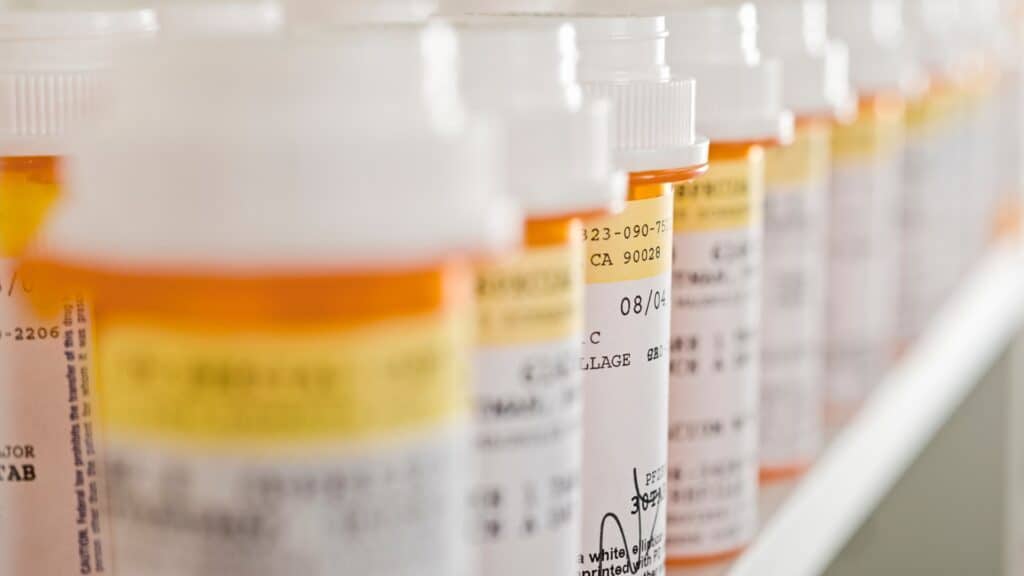06/05/2023
Common Drugs Found in Prescription Overdoses

While every prescription drug overdose is tragic, those that are caused by medical error can be especially devastating. That’s because of the breach of trust that the patient and their family feel. If a loved one has suffered an accidental prescription drug overdose, you have the right to bring a lawsuit against the physician, hospital, or pharmacy that made the error. While nothing can bring a deceased loved one back, you can recover damages that will help your family recover financially from the expenses and loss you faced, including:
- Medical expenses
- Lost income
- Funeral expenses
- Loss of the deceased’s companionship
- Pain and suffering
Prescription drugs that commonly lead to overdose
Some prescription drugs are more likely to lead to overdose than others, either because of their potency, addictiveness, or high probability of negative interaction with other medications. Some of the most commonly overdosed prescription drugs are explained below:
1. Darvocet:
Darvocet is an opiate pain medication that is prescribed for mild to moderate pain management. The active ingredient, propoxyphene, can lead to toxicity and death if the patient receives too much of the medication or is given the medication in conjunction with another prescription that inhibits the body’s ability to eliminate propoxyphene. Certain drugs, known as CYP3A4 inhibitors, greatly increase the likelihood of overdose when taken in conjunction with propoxyphene.
2. Generic morphine sulfate (Ethex recall)
Generic morphine sulfate is a narcotic that is prescribed for chronic pain. The manufacturer, Ethex corporation, has been subject to numerous recalls plus a class action lawsuit because their pills have contained as much as twice the amount of morphine they should have.
3. Fentanyl
Fentanyl is an opiate pain medication that is prescribed to opioid-tolerant patients (those who have used opiates continuously over time and require a higher dosage) who suffer from moderate to severe pain and require constant pain relief. Sold as “Duragesic,” the fentanyl is delivered slowly over the course of several days via a patch that is placed on the patient’s skin.
Overdoses most commonly occur when fentanyl is given to a patient who is not opioid-tolerant.
4. Heparin
Heparin (Coumadin) is an injectable anti-coagulant used to treat blood clots, clotting disorders and cardiac conditions. The dosage of Heparin must be carefully calculated based on the age and weight of the patient, their medical history, current medications, what condition is being treated, and the severity of the patient’s condition. Overdoses leading to internal bleeding and death can occur when too much of the medication is injected; if overdose is suspected, the patient should be treated with protamine sulfate.
5. Methadone
Methadone is a synthetic opiate used to treat chronic pain and opioid addiction. When being used to treat opioid addiction, the methadone is administered daily in liquid form at a methadone clinic (known as methadone maintenance treatment, or MMT). Many methadone clinic overdoses occur within the first week of treatment or if the patient combines their methadone dose with other drugs.
6. Morphine
Morphine is a narcotic opioid pain reliever prescribed for the treatment of moderate to severe pain. Highly potent and addictive, physical dependence and tolerance develops quickly.
The drug acts on the central nervous system and, in cases of overdose, can cause respiratory depression, asphyxia and death. The likelihood of overdose greatly increases if the sustained-release formula (MSContin) is chewed or crushed or if morphine is mixed with other opiates, CNS depressants, or benzodiazepines. The elderly and infants are at the highest risk of overdose from morphine due to medical error.
7. Oxycodone and Oxycontin
Oxycodone is a semi-synthetic opiate and Schedule II controlled substance that is the active ingredient in popular painkillers such as Percocet, Percodan, and Tylox. OxyContin is an extended release version of oxycodone and provides up to 12 hours of moderate to severe pain relief.
Oxycodone and OxyContin have a high potential for abuse and, once addicted, the patient must continue taking the medication or suffer severe withdrawal symptoms. The appropriate dosage varies by patient, but if the patient does not have tolerance for opioids or their tolerance is unknown, death can occur.
8. Tricyclic anti-depressants
Tricyclic anti-depressants are used to treat depression, migraines and neuropathic pain. Less commonly, they are prescribed to children to treat nighttime bedwetting, depression, and ADHD. The drug can slow down the heart’s ability to pump blood, leading to toxicity and death. Children are especially susceptible to tricyclic overdose.
9. Xanax
Alprazolam, commonly sold under the name Xanax or Xanax XR (extended-release), is a short-acting benzodiazepine that is used to treat moderate to severe anxiety disorders and panic attacks. Xanax is habit-forming and may cause physical dependence and withdrawal symptoms if the medication is stopped abruptly.
Xanax can’t be given to patients with certain conditions and interacts negatively with several commonly prescribed drugs, including propoxyphene.
Contacting Agencies for Accidental Prescription Overdose
If your loved one has suffered an accidental prescription drug overdose, it’s important to report the responsible party to the proper regulatory agency to prevent further mistakes from hurting others. The following agencies can help:
- If the physician is suspected of running a “pill mill” or otherwise recklessly giving potentially lethal prescriptions without medical cause, contact the Drug Enforcement Agency (DEA);
- If the overdose was caused by physician error, contact the Medical Board in your state;
- If the overdose was caused by a pharmacist or pharmacy error, contact the Board of Pharmacy in your state;
- If the overdose was caused by a methadone clinic, contact The Commission on Accreditation of Rehabilitation Facilities (federal) as well as the State Methadone Authority and Area Mental Health Authority.
To file a lawsuit against the responsible party, please contact us at the Deuterman Law Group. An experienced prescription drug overdose lawyer will help you contact the proper reporting agencies and pursue legal financial compensation for you or your loved one.




